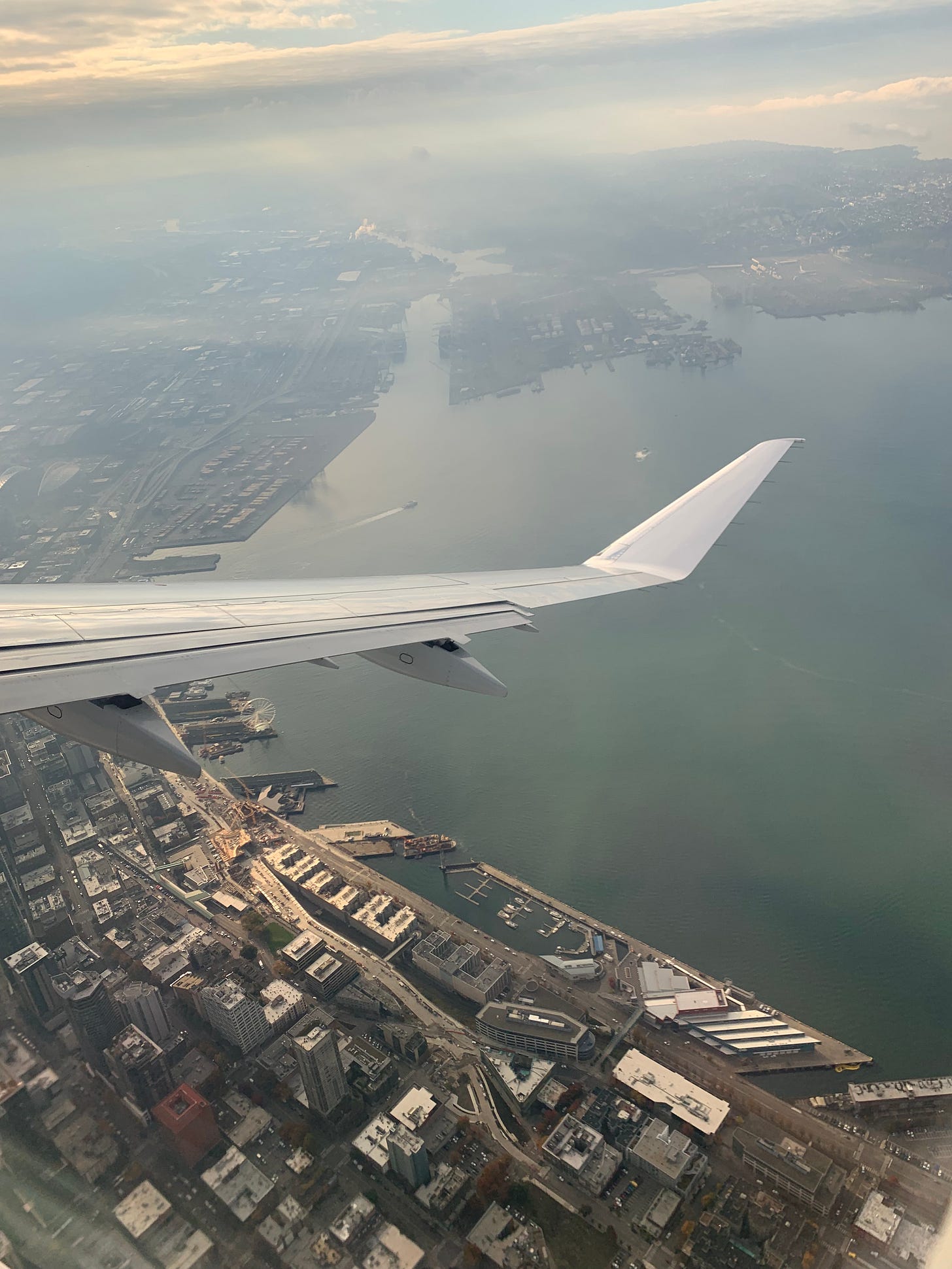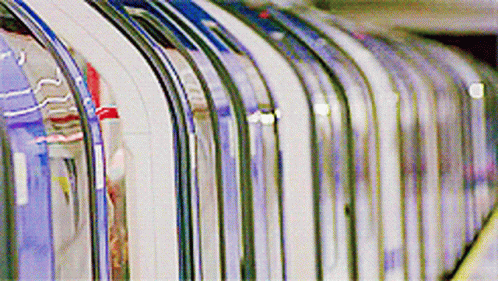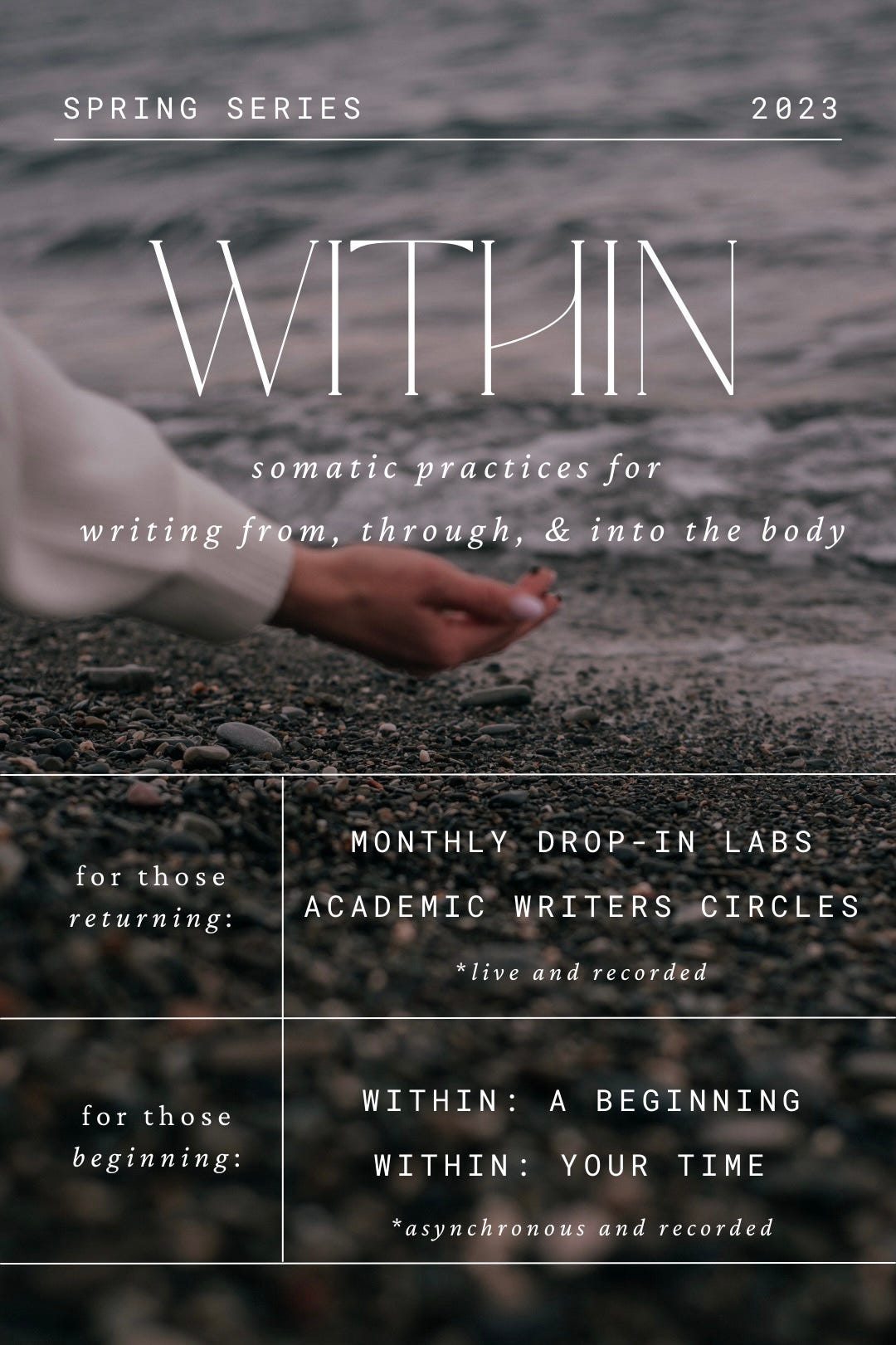the untils
takeoff and landing energies, sliding doors, mimetic desire, and the thing with decisions
“You change, if you’re lucky, strengthen yourself and your purpose over time; at best you are gaining orientation and clarity, in which something that might be ripeness and calm is filling in where the naiveté and urgency of youth are seeping away…
Sometimes now I envy those people who are at the beginning of the long road of the lives they’ll make, who still have so many decisions ahead as the road forks and forks again. Imagining their trajectories, I picture a real road, branching and branching, and I can feel it, shadowy, forested, full of the anxiety and the excitement of choosing, of starting off without quite knowing where you will end up…
Possibility means that you might be many things that you are not yet,
and it is intoxicating when it’s not terrifying.”
— Rebecca Solnit, Recollections of My Nonexistence
Dear You:
A quick note about The Liminal’s hibernation this winter. Quite a few of you found your way here in its midst! I’m delighted to welcome you to this corner of the internet where we ponder the art (and mess!) of living in the betwixt and between… Which sometimes requires getting very quiet, to listen and notice. The Liminal has been sleeping as I’ve been moving through an inner winter of sorts (I often find it tricky to write to anyone but myself from the depths of a messy middle). So, I’m writing you today with a bit more airspace and a searching spirit—with hope that my words might connect to your own sense of searching, whatever that may be.
Thank you for being here. In our pause, The Liminal turned three (3 years of this newsletter!!). We wouldn’t still be here were it not for the care, time, and presence you devote to engaging with and bringing life to my words. Let’s dive in.
xx, A
How do you make a choice?
From where do your choices tend to arise—the tug of a “should”? a flicker in your belly? the steering of your ego? the echo of an inherited story? someplace just beyond the blurry border of the self?
How do you trust a decision—that it’s really yours?
Whose voices and opinions must you comb through first?
Whose dreams have you mistaken for your own?
And how do you orient to this idea: that your own dreams are hardly static, but changing vibrant things, along with you?
— just a few of the small questions I’ve been pondering in this winter of winter, and an invitation to you to write into them, as reflective writing prompts this month.
On a recent work trip, my plane aborted its landing. Just when the wheels were about to hit the tarmac in Philadelphia, we were suddenly taking off again: soaring into the sky, jet engines firing, wheels folding in, the nose of the plane—which had been pointing downward—suddenly leaned up, up, up. Ground traded for clouds. The stomach-drop, the murmurs rippling down the cabin. The pilot on the loudspeaker announcing a second attempt. If all this weren’t uncanny enough, the exact same thing happened on my return flight, in the thick fog of a Copenhagen morning (you can’t make this up). In both directions, leaving and returning—an ambivalence, a change in trajectory, a re-visitation: a decision, taken in a split second.
This boomerang between landing and take-off energies felt comically familiar to me. For months, I’ve been moving through intense overlapping processes—professional and personal—which crescendoed in January and February. It’s been a dance of agency and surrender, a revisitation of trajectories set forth years ago, a crossroads.
Parts of me house a longing to land, while other parts are just taking off. As much as I try to resist mind-body dualisms, at times it has felt like a duel between the life of the mind and the life of this soft animal body (who loves what it loves). I’ve been embodying ambivalence — not in terms of a lack of care, as it’s often used colloquially, but in an intense felt sense of splitness, contradiction, multiplicity.
Do you know that feeling when something so taken-for-grantedly obvious becomes foreign, new to you once more—initiated when you are face-to-face with it in a more intimate way? This is how I’ve been feeling lately about the concept of decisions (as if I somehow haven’t made or participated in millions before…).
Some decisions are explicit, the proverbial fork in a road: left or right? But these are outnumbered by the mundane ways decisions populate our everyday. Many are not made in an instant, but unfurl slowly, imperceptibly. Only in retrospect can you see you were making them all along. Or maybe—you were not the one making them. Facing decisions reminds us how limited our own agency is: we are entangled—among multiple beings, relations, coincidences, matters beyond the myth of individual control. Sometimes, many times, life decides for us, or conspires in our decision-making (humans have devised innumerable explanations for this).
So when I’m talking about decisions here, I’m not necessarily talking about choices that are made by us as rational agents in a social-material vacuum, but as entangled beings who contain multitudes—within and without.
*
Do you remember that Gwenyth Paltrow movie from the late ‘90s, Sliding Doors? When Paltrow’s character misses her train, the narrative fractures into two: unraveling based on that single juncture. The phrase “sliding doors” has become somewhat of a cultural metaphor for an awareness that life could go either way, the idea that the ordinary instant (to paraphrase Didion) fractures our life into divergent paths: the one taken, and the one not.
(Somehow, after the missed train, none of the other junctures matter to the narrative.)
The problem with this mythology is we can get stuck in a paralysing awareness of our parallel paths, exploding the importance of the fork in the road itself while minimising the thinner stitches of its fabric: from where it was made, and what we do with that. Living-out in fantasy the version of ourselves on the other side of that thin veil can blind us to the other junctures in life that weren’t an explicit “yes” or “no” choice, the ones that unfurl both due and not due to our own doing. And yet, faced with a crossroad, it feels impossible not to indulge these parallel lives.
A friend told me recently there’s a phrase in French for this—passer a côté de la vie—living (or bypassing) next to life.
*
Suspended in waiting, I’ve grown aware of what I’ve been calling “The Untils” — the horizons we set for ourselves to bracket long periods of uncertainty, when things can go any number of ways. The space until a decision gets made (by you, by another, by biology, by fate, or what have you). The Untils are punctuations, marked by the “event” : a publication date. the letter you’ve been waiting for. a committee’s decision. a scan. a hypothetical due date. Until X, then I can finally Y.
The Untils entail a particular relationship with time and story, cause and effect. They promise (seductively) to give structure to the anxieties living in the liminal space between momentary resolutions, landing pads where life allows us to catch our breath—if only for a moment. They—as another brilliant friend helped me to see—provide narrative where a story is lacking, or direction for the one yet to be written.
The Untils are (almost) always framed by something external, something "known" or narrated (even if it never comes to pass), defined, a story written (by whom?). What they lack is imagination: the serendipitous, the unpredictable, the unwritten.
So much of modern life (especially in late capitalist contexts) is structured by The Untils, the checkpoints measuring a career or an education being our first indoctrination (my career path in academia is certainly rife with them). The pandemic momentarily throttled our personal and shared Untils, calling them into question on a collective scale. For a time, we had to be creative about living in their absence. I wonder how much of that shaken-awareness has dissipated as social life was hasty to get back to the Untilled version of itself. And what was lost, in that haste.
I’ve chased enough Untils by this point to know that they are rarely the summits they appear, staring at the horizon from a distance. And yet—against my greater knowing, I am felled again and again by The Untils. Still—what I’m finding increasingly more fascinating than the decisions or Untils is how we shape the space between them. The way we postpone our gratification (or our happiness, or even our awakeness to life) to some out-there someday horizon.
What might it take to shift our obsession with the punctuations to the tangle of words (life) that precede and follow them?
*
Lately my work of personal resistance has been to imagine myself as a cauldron. I mean this literally. I picture my body as a vessel holding a witch-brew of swirling voices and desires: my own and others. I see them pecking at each other, bubbling up to the surface, cohabiting (even in conflict) — all within me. This has been deeply uncomfortable and exhausting. But the visualisation helps.
Lingering in the irresolute has made me aware of just how many voices and desires populate me. Many are inherited—from structures, from (multiple) cultures, from a highly specific and narrow notion of success. They are the stories and narratives and dreams of others (even if they originated with the best of intentions) mixed and mistaken with my own, sometimes a blend of both.
I don’t want to glorify this cauldron. It doesn’t always feel empowering. Sometimes it can be deeply troubling. But it is also quintessentially human. Our soft animal bodies are social creatures. Entanglement and enmeshment is how we survive.
The French social theorist René Girard calls this mimetic desire—the human tendency to shape our own desires based on imitation of other humans, or a social model (if you’re interested in learning more about mimetic desire, writes a Substack called devoted to these questions).
The point may not be to wrest ourselves from our mimetic desires completely, but we can attune ourselves to them, become aware. The Untils framing the processes I’m moving through—career, family, mind, body, country, home—have an origin, a story they are trying to live out. While they appear to contradict one another—takeoffs and landings—they aren’t fundamentally opposed. Their conversation is revealing.
Listening, rather than rushing toward resolution, has helped me to (messily, slowly) claim the decision behind the decision — the sound of my own conviction (one that emerges from both innocence and experience, invention and inheritance). The one not that does not have to defend itself, or wait to be justified by an Until, or even make sense to an imagined other. The one who just: belongs.
Maybe that is the purpose of The Untils. Not as ports of arrival, but as lighthouses.
writing prompts
What “Untils” have been structuring your narrative of life lately?
Who wrote them? From where do they originate?
What felt sense does any given Until conjure in your body?
What does a focus on any given Until blur?
What are you postponing—a feeling? a reckoning? joy?
Write into the felt sense of postponement. And its opposite.
Feel free to share anything about your Untils in the discussion thread below!
on decisions: a related listen
This conversation between poet Layli Long Soldier and writer Mira Jacob broaches making a decision (39:47) for one’s own health and one’s family, accepting the way life’s decisions intersect with timing, dismantling “achievement” and the mindset of endlessly proving oneself, and an idea of abundance untethered from “success.”
WITHIN—somatic writing—returns! spring series 2023
WITHIN—my embodied writing series which weaves yoga asana, breathwork, meditation, and writing—returns this spring in many forms. For past participants: monthly drop-in labs and circles for professional/academic writers. For those new to WITHIN: two asynchronous offerings to join the practice/community—Your Time and A Beginning—before our next live 3-month series begins (again) in September 2023.
enraptured: what’s calling my attention lately*
*3 months worth of recommendations bundled and sifted into one
reading:
The Years by Annie Ernaux. This sweeping and genre-defying work spans the cultural and personal transformations of time: intimate and collective at once. For those in Sweden, Ernaux (winner of the 2022 Nobel Prize in Literature) will be speaking at Malmö’s Författarscenen on May 17!
Good for a Girl: A Woman Running in a Man’s World by Lauren Fleshman. Lauren was an idol of mine, growing up as a cross-country runner in Oregon. Lauren’s incisive lens on patriarchy and sport, and its consequences for female-bodied body image, gender identity, physical & mental health, is crushing as it is igniting.
On the subject of idols…
on the “admiration to animosity pipeline,” told through Joan Didion’s aprons, in her new Substack :“She is the godlike parent turned mortal, an idol I had to dismantle to become a writer. I can’t imagine a frame of reference for what I do without her, but mostly these days, when I see her mentioned, I’m—dare I say it—bored.”
listening:
This exquisite conversation with poet Jane Hirshfield includes an incredible conversation about the relationship between the body and writing, from an ecological perspective. I highly recommend a listen.
doing:
Being a beginner. I recently discovered the joy of hand-building with clay. In the midst of a process that demands performed expertise, being a complete novice at something else has been the ultimate relief/release.
London Writer’s Salon Writers’ Hour. Free, with four different times each day to accommodate all time zones. I’m completely hooked. There most weekdays at 9am CET — join me!
750 words. A word-tracker and writing log, with a special reward for your daily 750. I never knew digital confetti was so motivating to me, but apparently it is.
non-doing:
This meditation held my hand through some challenging moments over the past few months. If you’re approaching an Until that feels intimidating, anxiety-provoking, or unfathomable — carve 20 minutes out to sit with this.









